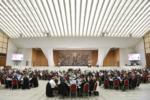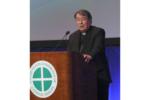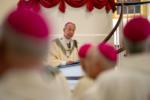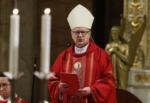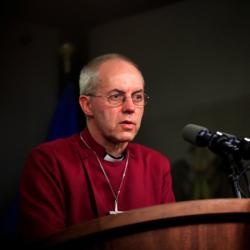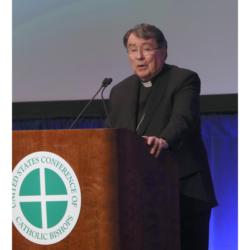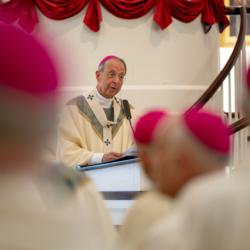Archdiocese's Pro-life Hispanic Congress celebrates dignity of human life
LAWRENCE -- Coming all the way from his Diocese of El Paso, Texas, to be part of the archdiocese's Pro-life Hispanic Congress, Bishop Mark J. Seitz concelebrated the opening Mass of the two-day gathering held at St. Mary of the Assumption Parish, Lawrence, on May 31.
In his homily, Bishop Seitz reflected on the day's Gospel reading of the Visitation, which narrates the story of the meeting between a pregnant Mary and her older cousin Elizabeth, who was pregnant with John the Baptist.
Bishop Seitz said the story shows that "we're connected to every person in the world, and we're called to be part of each other's lives."
"Consider this: Elizabeth reveals the divine maternity of Mary; Mary announces the Gospel to Elizabeth. John the Baptist presents Jesus as the Messiah; Jesus manifests himself as the savior of the world," he said.
"Since we are in our mother's womb, we're called to go on this earthly pilgrimage together," he added.
After the Mass, he and the other clergy members in attendance, including Bishop Robert F. Hennessey, processed through the streets of Lawrence -- the Eucharistic host held high in a golden monstrance leading the crowd that blended members of the Knights of Columbus, religious sisters, and laypeople from all across the archdiocese.
The congress continued the following day, Saturday, June 1, at the Holy Rosary Shrine in Lawrence.
In a welcoming to attendees, Sylvia Fernandez del Castillo, director of the archdiocese's Pro-Life Office and principal organizer of the congress, outlined the day's events: a stellar lineup of speakers, loads of food, music, and vendors selling items such as religious goods and pro-life T-shirts.
Catholic educator Ester Munt-Brooks was the first speaker of the day. In her talk entitled "The Fundamentals of Pro-Life," she explored the subject of hope, cautioning the audience not to confuse it with optimism.
"Being optimistic is great . . . But hope is not the same as optimism. Hope is a virtue," she said, "a virtue that has been in our hearts since baptism."
Munt-Brooks went on to offer three suggestions to develop the virtue of hope: deposit all trust in God, make an effort to accept the will of God by facing everything -- good and bad -- that transpires in life, and have a rich prayer life.
Auxiliary Bishop Cristiano Barbosa, who is a trained psychologist, addressed the topic "How to Talk with Your Children about Sex."
He urged parents to be "welcoming, loving, and truthful" when speaking with their children about sexuality, an act, he said, that is both loving and meant to procreate.
"God loved us into creation. To love and to create are the same action, and the creation expresses his love. Thus, we're the expression of the love of God," the bishop noted.
Bishop Barbosa acknowledged that most parents find it hard to have conversations with their children about sex, so he advised them to seek the counsel of people they could trust -- perhaps a trained priest or a Catholic psychologist -- "so you can talk without reacting."
"One thing is a reaction, another one is a response -- and a response is given by those who think first," he said.
Speaking to The Pilot during the congress, Fernandez del Castillo, a native of Mexico, said that she wanted to bring the event to Lawrence because it is a city that has always welcomed immigrants with open arms.
With a predominantly Hispanic population, Lawrence is the home to many who find themselves living between two cultures, but "it is our culture, the one that affirms life, that loves life, that recognizes the sanctity of life, that recognizes God's nature within every human being, that's the culture to which they need to hear -- the culture they need to defend," Fernandez del Castillo said.
As children of God, she said, "We need to bring to heaven as many people as possible. And, without this pro-life message, without this love for life, without this love for us whom he has made in his image, we cannot do it."
Fernandez del Castillo added that the archdiocese sends a strong pro-life message not only through its Pro-Life Office but also through its three Pregnancy Help Boston centers in Natick, Brighton, and Brockton and their many programs.
Speaker Luisa de Poo, who serves as director of Life, Marriage, and Family for the Diocese of Austin, Texas, echoed Fernandez del Castillo's words in her session titled "The Church's Response of Love towards Needy Mothers."
During her talk, de Poo said that the vocation of motherhood is a gift from God, and while motherhood should be promoted that way, it has become increasingly difficult to see it as a gift.
"The world is sending us the message that being a mother is being a woman of an inferior category, that what matters in life is achieving personal success," she said.
The ideal place for motherhood is within marriage, de Poo said. However, when women find themselves alone during this time, "it is our baptismal call to accompany those who need it the most, the call we have to be a church that goes out, our call to solidarity," she said.
Like Fernandez del Castillo, de Poo referenced the three Pregnancy Help Boston centers, which have nurses and social assistants, whose mission is to offer compassionate alternatives and practices that will defend the lives of women experiencing difficult pregnancies.
Adolfo Castaneda, director of education for Human Life International, traveled from Florida to present the session "Theology of the Body," based on the 129 catecheses given by Pope St. John Paul II during his Wednesday audiences at the Vatican between 1979 and 1984.
Organized in six parts, including sections "Original Unity," "Purity of Heart," "The Resurrection of the Body," "Celibacy and Virginity," "The Sacrament of Marriage," and "Love and Fecundity," Castaneda focused his talk on the latter two.
Castaneda said that, in marriage, the husband represents Jesus and the wife represents the church, referring to the sacrificial love of Christ as the ultimate act of humility and selflessness.
He went on to say: "Spouses must reverence each other, treat them well, take care of their feelings, take care of their thoughts, and their lives."


